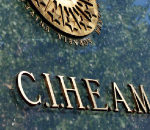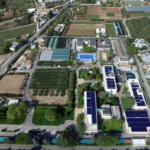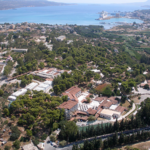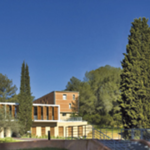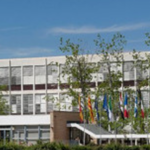Improving nutrition in Africa by strengthening the diversity, sustainability, resilience and connectivity of food systems

HealthyFoodAfrica is an EU-funded research & innovation action aiming at sustainable, equitable and resilient food systems in African cities. The project is a collaborative effort by 17 partners in both Europe and Africa.
The overall goal of HealthyFoodAfrica is to make food systems in 10 African cities in six countries across three African macro-regions more sustainable, equitable and resilient by reconnecting food production and food consumption in effective ways.
Objectifs
Improving access to nutritious food is a systemic challenge. African agri-food systems are facing numerous challenges related to climate change, rapid population growth and urbanization. Both food production and consumption patterns must change in order to provide access to nutritious food while counteracting social inequality, environmental degradation, food loss and inadequate waste management.
Activités
17 European and African partners work in close collaboration to improve nutrition in Africa by strengthening the diversity, sustainability, resilience and connectivity of food systems.
The work in HealthyFoodAfrica is localized in ten African cities, the so-called Food System Labs (FSL). Cross cutting work is undertaken in nine work packages.
Résultats et impact
-
HealthyFoodAfrica seeks to create 10 Food System Labs (FSLs) in 10 cities and 6 countries in Eastern, Western and Southern Africa. Each FSL will bring together local stakeholders – farmers, entrepreneurs, businesses, and policymakers. With the support of the partners, labs will tackle particular locally relevant food system challenges, from consumer awareness to sustainable production, local food diversity, improved post-harvest technologies and food safety.
-
The Food System Labs aim to link local producers and consumers, diversify the product selection, and bolster local supply chains to create a more sustainable production system and promote more healthy and equitable diets. The Food System Labs are supported by researchers and practitioners from Europe and Africa, who will also enhance and facilitate the learning processes within each lab and across them.
-
The participatory, multi-actor approach will ensure food system transformation not only in the ten Food System Lab cities but also in wider terms: the local solutions developed and piloted in the Food System Labs will be shared and disseminated to allow their adaptation to other countries and circumstances as well.
-
“Only through linking the diverse expertise and knowledge this type of consortium includes, there is potential to develop tools for actual transformation. Both local knowledge and new technology are necessary, but the key to achieving sustainable change is in combining these to respond to context-specific challenges” summarizes HealthyFoodAfrica Project Coordinator, Senior Scientist Mila Sell from the Natural Resources Institute Finland.
En savoir plus
Source de financement
European Union, H2020 project
Programme et contacts
- Coordinator: Natural Resources Institute Finland, healthyfoodafrica(a)luke.fi
- Principal Investigator at CIHEAM Montpellier: Paolo Prosperi , Lecturer-researcher - prosperi@iamm.fr
Partenaires
- The Alliance of Bioversity International and CIAT
- Council for Scientific & Industrial Research, Ghana (CSIR)
- African Population & Health Research Centre Kenya (APHRC)
- Norwegian Institute of Bioeconomy Research (NIBIO)
- University of Helsinki, Finland (UH)
- Bahir Dar University, Ethiopia (BDU)
- University of Makerere, Uganda (MAK)
- University of Zambia (UNZA)
- University of Pisa, Italy (UNIPI)
- University of Abomey-Calavi, Benin (UAC)
- Aeres University of Applied Sciences, Netherlands
- Hivos
- Finn Church Aid (FCA)
- Centre for Initiatives on Food Security and Environment (GIFSE)
- Mentes Visiveis Lda (MV)
- House of Böna Ltd
- Centre International de Hautes Etudes Agronomiques Méditerranéennes - Institut Agronomique Méditerranéen de Montpellier (CIHEAM Montpellier)


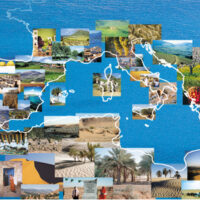 L'institut de MontpellierNotre vision est celle d’un bassin méditerranéen au sein duquel l’esprit de coopération prévaut.
L'institut de MontpellierNotre vision est celle d’un bassin méditerranéen au sein duquel l’esprit de coopération prévaut.
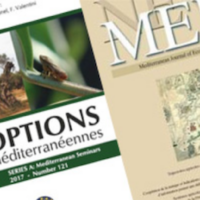 Publications du CIHEAMNos publications et outils de communication visent à faciliter les processus de prise de décision pour les acteurs politiques, économiques et agricoles de la région méditerranéenne.
Publications du CIHEAMNos publications et outils de communication visent à faciliter les processus de prise de décision pour les acteurs politiques, économiques et agricoles de la région méditerranéenne. Actualités et événements
Actualités et événements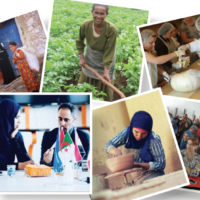 Revue de presse (Scoop.it)
Revue de presse (Scoop.it) Programmes de MasterLe CIHEAM Montpellier c’est à la fois un accompagnement personnalisé et une ouverture à l’international.
Programmes de MasterLe CIHEAM Montpellier c’est à la fois un accompagnement personnalisé et une ouverture à l’international.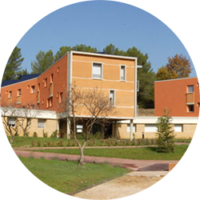 Campus & vie étudianteDepuis 1962 nous accueillons près de 95% d’étudiants internationaux.
Campus & vie étudianteDepuis 1962 nous accueillons près de 95% d’étudiants internationaux.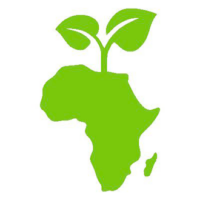
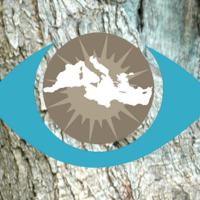 Portail documentaireUn Centre de documentation unique sur la Méditerranée,
investi dans le partage des connaissances.
Portail documentaireUn Centre de documentation unique sur la Méditerranée,
investi dans le partage des connaissances. Production scientifiqueLa politique des publications du CIHEAM est depuis longtemps engagée dans le mouvement du libre accès et du partage des connaissances.
Production scientifiqueLa politique des publications du CIHEAM est depuis longtemps engagée dans le mouvement du libre accès et du partage des connaissances. Devenir partenairesTisser des partenariats fait partie de l’ADN du CIHEAM Montpellier... Rejoignez ses projets ou ses formations, soutenez ses actions.
Devenir partenairesTisser des partenariats fait partie de l’ADN du CIHEAM Montpellier... Rejoignez ses projets ou ses formations, soutenez ses actions.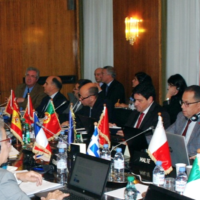 Réunions ministériellesA travers les Ministérielles , le CIHEAM contribue à la construction d'un dialogue entre les pays méditerranéens autour des questions relatives à l'agriculture et au monde rural.
Réunions ministériellesA travers les Ministérielles , le CIHEAM contribue à la construction d'un dialogue entre les pays méditerranéens autour des questions relatives à l'agriculture et au monde rural.